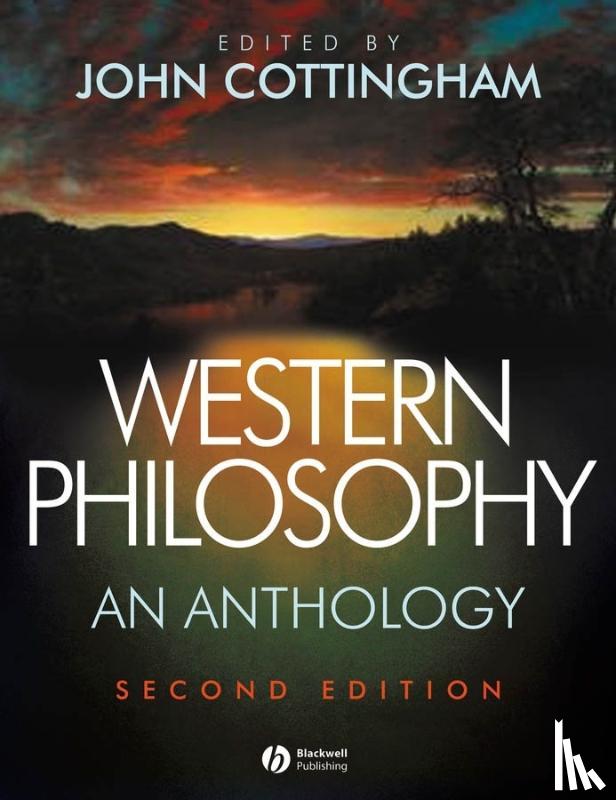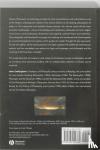Omschrijving
Western Philosophy: An Anthology provides the most comprehensive and authoritative survey of the Western philosophical tradition from ancient Greece to the leading philosophers of today. Western Philosophy: An Anthology provides the most comprehensive and authoritative survey of the Western philosophical tradition from ancient Greece to the leading philosophers of today. Preface.Acknowledgements.Advice to Readers and Format of the Volume.Part I: Knowledge and Certainty:.1. Innate Knowledge: Plato, Meno.2. Knowledge versus Opinion: Plato, Republic.3. Demonstrative Knowledge and its Starting points: Aristotle, Posterior Analytics.4. New Foundations for Knowledge: René Descartes, Meditations.5. The Senses as the Basis of Knowledge: John Locke, Essay concerning Human Understanding.6. Innate Knowledge Defended: Gottfried Leibniz, New Essays on Human Understanding.7. Scepticism versus Human Nature: David Hume, Enquiry concerning Human Understanding.8. Experience and Understanding: Immanuel Kant, Critique of Pure Reason.9. From Sense certainty to Self consciousness:Georg Hegel, Phenomenology of Spirit.10. Against Scepticism: G. E. Moore, A Defence of Common Sense.11. Does Empirical Knowledge Have a Foundation?: Wilfrid Sellars, The Myth of the Given.12. The Conditions for Knowledge: Edmund Gettier, Is Justified True Belief Knowledge?..Part II: Being and Reality:.1. The Allegory of the Cave: Plato, Republic.2. Individual Substance: Aristotle, Categories.3. Supreme Being and Created Things: René Descartes, Principles of Philosophy.4. Qualities and Ideas: John Locke, Essay concerning Human Understanding.5. Substance, Life and Activity: Gottfried Leibniz, New System.6. Nothing Outside the Mind: George Berkeley, Principles of Human Knowledge.7. The Limits of Metaphysical Speculation: David Hume, Enquiry concerning Human Understanding.8. Metaphysics, Old and New: Immanuel Kant, Prolegomena.9. Being and Involvement: Martin Heidegger, Being and Time.10. The End of Metaphysics?: Rudolf Carnap, The Elimination of Metaphysics.11. The Problem of Ontology: W. V. O. Quine, On What There Is.12. Why is There Anything?: Derek Parfit, The Puzzle of Reality.Part III: Language and Meaning:.1. The Meaning of Words: Plato, Cratylus.2. Language and its Acquisition: Augustine, Confessions.3. Thought, Language and its Components: William of Ockham, Writings on Logic.4. Language, Reason and Animal Utterance: René Descartes, Discourse on the Method.5. Abstract General Ideas: John Locke, Essay concerning Human Understanding.6. Particular Ideas and General Meaning: George Berkeley, Principles of Human Knowledge.7. Denotation versus Connotation: John Stuart Mill, A System of Logic.8. Names and their Meaning: Gottlob Frege, Sense and Reference.9. Definite and Indefinite Descriptions: Bertrand Russell, Introduction to Mathematical Philosophy.10. Non descriptive Uses of Language: J. L. Austin, Performative Utterances.11. Language, Meaning and Context: Paul Grice, Logic and Conversation.12. How the Reference of Terms is Fixed: Saul Kripke, Naming and Necessity.Part IV: Mind and Body:.1. The Immortal Soul Plato, Phaedo.2. Soul and Body, Form and Matter Aristotle, De Anima.3. The Human Soul Thomas Aquinas, Summa Theologiae.4. The Incorporeal Mind: René Descartes, Meditations.5. The Identity of Mind and Body: Benedict Spinoza, Ethics.6. Mind Body Correlations: Nicolas Malebranche, Dialogues on Metaphysics.7. Body and Mind as Manifestations of Will:.Arthur Schopenhauer, The World as Will and Idea.8. The Problem of Other Minds.John Stuart Mill, An Examination of Sir William Hamilton s Philosophy.9. The Hallmarks of Mental Phenomena.Franz Brentano, Psychology from an Empirical Standpoint.10. The Myth of the `Ghost in the Machine .Gilbert Ryle, The Concept of Mind.11. Mental States as Functional States.Hilary Putnam, Psychological Predicates.12. The Subjective Dimension of Consciousness: Thomas Nagel, What is it Like to be a Bat?.Part V: The Self and Freedom:.(a) The Self.1. The Self and Consciousness: John Locke, Essay concerning Human Understanding.2. The Self as Primitive Concept: Joseph Butler, Of Personal Identity.3. The Self as Bundle: David Hume, A Treatise of Human Nature.4. The Partly Hidden Self: Sigmund Freud, Introductory Lectures on Psychoanalysis.5. Liberation from the Self: Derek Parfit, Reasons and Persons.6. Selfhood and Narrative Understanding: Charles Taylor, Sources of the Self.(b) Freedom.7. Human Freedom and Divine Providence: Augustine, The City of God.8. Freedom to Do What We Want: Thomas Hobbes, Liberty, Necessity and Chance.9. Absolute Determinism: Pierre Simon de Laplace, Philosophical Essay on Probability.10. Condemned to be Free: Jean Paul Sartre, Being and Nothingness.11. Determinism and our Attitudes to Others: Peter Strawson, Freedom and Resentment.12. Freedom, Responsibility and the Ability to do Otherwise.Harry G. Frankfurt, Alternate Possibilities and Moral Responsibility.Part VI: God and Religion:.1. The Existence of God: Anselm of Canterbury, Proslogion.2. The Five Proofs of God: Thomas Aquinas, Summa Theologiae.3. God and the Idea of Perfection: René Descartes, Meditations.4. The Wager: Blaise Pascal, Pensées.5. The Problem of Evil: Gottfried Leibniz, Theodicy.6. The Argument from Design: David Hume, Dialogues concerning Natural Religion.7. Against Miracles: David Hume, Enquiry concerning Human Understanding.8. Faith and Subjectivity: Søren Kierkegaard, Concluding Unscientific Postscript.9. Reason, Passion and the Religious Hypothesis: William James, The Will to Believe.10. The Meaning of Religious Language: John Wisdom, Gods.11. God s Commands as the Foundation for Morality:.Robert M. Adams, Moral Arguments for Theistic Belief.12. Against Evidentialism: Alvin Plantinga, Is Belief in God Properly Basic?.Part VII: Science and Method:.1. Four Types of Explanation: Aristotle, Physics.2. Experimental Methods and True Causes: Francis Bacon, Novum Organum.3. Mathematical Science and the Control of Nature: René Descartes, Discourse on the Method.4. The Limits of Scientific Explanation: George Berkeley, On Motion.5. The Problem of Induction: David Hume, Enquiry concerning Human Understanding.6. The Relation between Cause and Effect: David Hume, Enquiry concerning Human Understanding.7. Causality and our Experience of Events: Immanuel Kant, Critique of Pure Reason.8. The Uniformity of Nature: John Stuart Mill, System of Logic.9. Science and Falsifiability: Karl Popper, Conjectures and Refutations.10. How Explaining Works: Carl G. Hempel, Explanation in Science and History.11. Scientific Realism versus Instrumentalism:.Grover Maxwell, The Ontological Status of Theoretical Entities.12. Change and Crisis in Science: Thomas Kuhn, The Structure of Scientific Revolutions.Part VIII: Morality and the Good Life:.1. Morality and Happiness: Plato, Republic.2. Ethical Virtue: Aristotle, Nicomachean Ethics.3. Virtue, Reason and the Passions: Benedict Spinoza, Ethics.4. Human Feeling as the Source of Ethics:.David Hume, Enquiry concerning the Principles of Morals.5. Duty and Reason as the Ultimate Principle.Immanuel Kant, Groundwork of the Metaphysic of Morals.6. Happiness as the Foundation of Morality: John Stuart Mill, Utilitarianism.7. Utility and Common sense Morality: Henry Sidgwick, Methods of Ethics.8. Against Conventional Morality: Friedrich Nietzsche, Beyond Good and Evil.9. Duty and Intuition: W. D. Ross, The Right and the Good.10. Rational Choice and Fairness: John Rawls, A Theory of Justice.11. Ethics as Rooted in History and Culture: Alasdair MacIntyre, After Virtue.12. Could Ethics be Objective?: Bernard Williams, Ethics and the Limits of Philosophy.Part IX: Problems in Ethics:.1. Inequality, Freedom and Slavery: Aristotle, Politics.2. War and Justice: Thomas Aquinas, Summa Theologiae.3. Taking One s Own Life: David Hume, On Suicide.4. Gender, Liberty and Equality: Mary Wollstonecraft, A Vindication of the Rights of Women.5. Partiality and Favouritism: William Godwin, Enquiry concerning Political Justice.6. The Status of Non human Animals: Immanuel Kant, Lectures on Ethics.7. The Purpose of Punishment: Jeremy Bentham, Principles of Morals and Legislation.8. Our Relationship to the Environment: Aldo Leopold, The Land Ethic.9. Abortion and Rights: Judith Jarvis Thomson, A Defense of Abortion.10. The Relief of Global Suffering: Peter Singer, Famine, Affluence and Morality.11. Medical Ethics and the Termination of Life: James Rachels, Active and Passive Euthanasia.12. Cloning, Sexual Reproduction and Genetic Engineering: Leon R. Kass, The Wisdom of Repugnance.Part X: Authority and the State:.1. Our Obligation to Respect the Laws of the State: Plato, Crito.2. The Just Ruler: Thomas Aquinas, On Princely Government.3. Sovereignty and Security: Thomas Hobbes, Leviathan.4. Consent and Political Obligation: John Locke, Second Treatise of Civil Government.5. Against Contractarianism: David Hume, Of the Original Contract.6. Society and the Individual: Jean Jacques Rousseau, The Social Contract.7. The Unified State from Individual Desire to Rational Self determination.Georg Hegel, The Philosophy of Right.8. Property, Labour and Alienation: Karl Marx and Friedrich Engels, The German Ideology.9. The Limits of Majority Rule: John Stuart Mill, On Liberty.10. The Minimal State: Robert Nozick, Anarchy, State and Utopia.11. Social Co operation and Rational Self interest: David Gauthier, Why Contractarianism?.12. Liberalism, Resources and Equal Worth: Ronald Dworkin, Why Liberals Should Care about Equality.Part XI: Beauty and Art:.1. Art and Imitation: Plato, Republic.2. The Nature and Function of Dramatic Art: Aristotle, Poetics.3. The Idea of Beauty: Francis Hutcheson, Inquiry concerning Beauty, Order, Harmony, Design.4. Aesthetic Appreciation: David Hume, Of the Standard of Taste.5. The Concept of the Beautiful: Immanuel Kant, Critique of Judgement.6. The Metaphysics of Beauty: Arthur Schopenhauer, On Aesthetics.7. The Two Faces of Art: Friedrich Nietzsche, The Birth of Tragedy.8. The Value of Art: Leo Tolstoy, What is Art?.9. Imagination and Art: Jean Paul Sartre, The Psychology of Imagination.10. What is Aesthetics?: Ludwig Wittgenstein, Lectures on Aesthetics.11. The Basis of Judgements of Taste: Frank Sibley, Aesthetic Concepts.12. Artistic Representation and Reality: Nelson Goodman, The Languages of Art.Part XII: Human Life and its Meaning:.1. How to Accept Reality and Avoid Fear: Lucretius, On the Nature of the Universe.2. Life Guided by Stoic Philosophy: Seneca, Moral Letters.3. Meaning Through Service to Others: Augustine, Confessions.4. Contentment with the Human Lot: Michel de Montaigne, On Experience.5. The Human Condition, Wretched yet Redeemable: Blaise Pascal, Pensées.6. Human Life as a Meaningless Struggle: Arthur Schopenhauer, On the Vanity of Existence.7. The Death of God and the Ascendancy of the Will: Friedrich Nietzsche, Thus Spake Zarathustra.8. Idealism in a Godless Universe: Bertrand Russell, A Free Man s Worship.9. Futility and Defiance: Albert Camus, The Myth of Sisyphus.10. Involvement versus Detachment: Thomas Nagel, The Absurd.11. Religious Belief as Necessary for Meaning: William Lane Craig, The Absurdity of Life without God.12. Seeing our Lives as Part of the Process: Robert Nozick, Philosophy s Life.Notes on the Philosophers.Index




